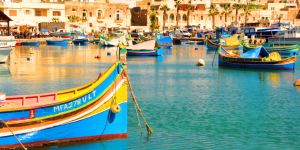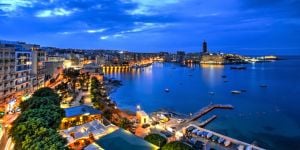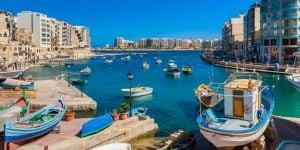
Malta has a rather developed healthcare system. With several hospitals and clinics, as well as care centers and pharmacies in almost every village, the country offers quality and convenient care. As a foreigner, what is your situation in terms of medical coverage? Take stock and ensure you're well-covered when settling into your new country. Find out about the options available to you depending on your place of residence, national medical coverage, and private coverage.
The healthcare system in Malta
The Maltese healthcare system is state-funded through general taxation. All residents of the country receive free research, prevention, treatment, and rehabilitation in public hospitals. Low-income individuals can benefit from assistance in the form of a card that allows them to obtain free medication after proving their resources to the Ministry of Social Security. People suffering from certain chronic illnesses can also receive free treatment without means testing.
Primary healthcare is provided by medical centers offering a wide range of prevention, treatment, and rehabilitation services. Specialized facilities (such as diabetes, gynecology, prenatal and postnatal care, child care, ophthalmology, podiatry, speech therapy, psychiatry, etc.) are available in addition to nursing care and general medical services.
Many residents choose to go through private sector general practitioners and specialists for primary care. Several hospitals provide secondary and tertiary healthcare.
Any foreigner residing in Malta must contribute to the national social security system, granting them access to free healthcare. Employees are entitled to free healthcare once they have been working in Malta for more than three months. The same applies to self-employed individuals, who must contribute to the social security system.
The contribution rate depends on professional status (employee, self-employed, or non-employed), age, and income. For employees, the contribution is 10% of their gross salary, with the remaining 10% covered by the employer. Check the Malta Social Security Department website to find out the rate applicable to your situation.
Like in many other countries, the Maltese healthcare system is divided into two: the public sector and the private sector. Both are supported by care centers that provide regular health check-ups, tests, and basic care. Generally, the Maltese healthcare system provides quality care, although waiting times can be somewhat long in certain cases.
It is based on the British system and is therefore often compared to the UK's national health system. The private system is very developed, and the care is excellent, but the costs are much higher than in the public sector. Some foreigners prefer to go to private clinics and doctors to get an appointment more quickly.
For a minor health issue, you can go to a pharmacy, many of which are equipped with a consultation room with a general practitioner and sometimes a specialist. Private healthcare services are also popular with both Maltese and foreign residents. Employees are generally offered health insurance by their employer.
Good to know:
The healthcare system is funded by taxpayers through the Maltese social security system.
Healthcare for expats in Malta
If you plan to live and work in Malta for more than three months, whether as an employee or as a self-employed worker, you will need to contribute to the Maltese social security system. A percentage of your gross salary will be deducted, while your employer will make another contribution. It is recommended to have coverage when you leave your home country to settle in Malta.
If you are coming from an EU country, consider applying for a European Health Insurance Card (EHIC) to cover the first 90 days following your installation in Malta. This card, free of charge, is issued upon request by your national health insurance fund. The EHIC provides access to:
- Healthcare services provided by the state during a short stay in any European Union (EU) and European Economic Area (EEA) country, as well as in Switzerland and the UK;
- The Maltese healthcare system under the same conditions and at the same cost as Maltese citizens and residents insured in Malta.
Good to know:
Private care is not covered by the EHIC, which only covers unexpected and urgent care.
Once you are a resident in Malta, the EHIC is no longer valid. To replace it, you must contribute to be covered by the Maltese national health system. Non-EU nationals and non-residents are not entitled to the EHIC. They must take out private international health insurance before their departure. It is strongly advised to keep this insurance at least until they are covered by Maltese social security. They may also choose to keep this private insurance for even broader coverage. Indeed, some private insurances cover their beneficiaries during their travels outside the European Union.
Obtaining a social security number in Malta
Foreign nationals intending to live and work in Malta must apply for an electronic residence card. Once received, it allows access to social security if necessary. Beneficiaries of Maltese social security, taxpayers, are identified by an individual national insurance number. For more information:
- Visit the government's social security website;
- Click here to complete and submit the online form. Certain documents are required, depending on your situation.
If you are an EU national, you will need to provide:
- Your passport or identity card issued by your home country;
- A copy of the "promise of employment", to prove that you will work in Malta (either employed or self-employed).
If you are a third-country national, you will need to provide the following documents:
- Your passport and your Maltese identity card (if available);
- A copy of the "promise of employment";
- Your work permit.
Important:
All foreigners residing in Malta for more than three months must have a residence permit. This permit entitles them to social security coverage.
Private health insurance in Malta
Maltese social security offers good coverage, but it excludes certain care, such as dental and eye care. Private health insurance allows for full or partial reimbursement when visiting private clinics. If you travel frequently abroad, especially outside the EU, this private insurance will also cover you. Therefore, it is wise to take out international private health insurance in addition to Maltese social security for optimized coverage.
Medical services in Malta
The choice of doctor depends on the nature of the problem. The general practitioner treats colds, children's mumps, etc., but for specific or serious issues, you need to consult a specialist. Malta has very good doctors, who are also sufficiently numerous: there are 4.3 doctors per 1,000 inhabitants!
Find a general practitioner by consulting the yellow pages or a website listing doctors by city. The "Useful links" section at the end of this article will tell you more about this subject and also provide you with a list of hospitals and clinics.
For a consultation with a general practitioner in Malta, expect to pay between 10 and 20 euros. A specialist consultation costs between 30 and 80 euros, while a visit to the dentist averages 40 euros. A crown costs about 300 euros.
You will indeed find many specialists in Malta, such as dentists, physiotherapists, pediatricians, gynecologists, and ophthalmologists. Remember that a specialist consultation is considered private practice, thus not reimbursable by the EHIC.
Recently, it has become possible to access telehealth services in Malta. Through the Mobi Doctor website, you can consult a general practitioner or a specialist online, without leaving your home. Registration is free, and patients book their appointments at the rate indicated under the chosen slot.
Hospitals and clinics in Malta
Mater Dei Hospital is the largest and main public hospital in Malta. Located in Msida, Mater Dei has a variety of specialists and provides emergency care to both inpatients and outpatients. This facility, which opened in 2007, replacing St Luke's Hospital, has 906 beds, 25 operating rooms, and has also set up an oncology department.
St Vincent de Paul Hospital is the main public retirement home in Malta. Mount Carmel Hospital specializes in mental health. Located in Attard, it offers outpatient and rehabilitation care, both psychological and psychiatric. It also provides support for social reintegration. The multidisciplinary approach of the healthcare staff allows for treatment tailored to each case.
Located in Victoria (Rabat), the Gozo General Hospital has 303 beds. Different services can accommodate patients for short stays, while psychiatric and geriatric services allow for long-term hospitalization. In case of a diving accident, this hospital has hyperbaric equipment.
Other hospitals include the Sir Paul Boffa Oncology Hospital in Floriana, as well as Karin Grech Hospital in Msida, specialized in rehabilitation and convalescence. Additionally, private health centers are found throughout the islands. The Saint James Hospital group, for example, operates four private hospitals in Malta: Saint James Capua Hospital in Sliema, Saint James Hospital in Tal-Barrani, Saint James Hospital in Burmarrad, and Saint James Eye Clinic.
Finally, there are free public health centers located in several areas of Malta. They are at the heart of the primary care system established by the Maltese government. Click here to obtain the list of these health centers in Malta.
Pharmacies in Malta
In Malta, pharmacies can be found in almost every village. Please note that some medications are only available on prescription. Click here to find the nearest pharmacy in Malta. Pharmacies also offer paid consultations by appointment or walk-in, but these generally only concern minor health issues.
Some offer services such as blood pressure checks, urine tests, blood tests, and allergy tests. Pharmacies in Malta generally have standard opening hours and close on Sundays. However, thanks to a relay system, there is always an on-call pharmacy open on Sundays. Check the government website to find out which pharmacies are open this Sunday.
Emergency numbers in Malta
For medical emergencies in Malta, call 112 or go to the nearest accident and emergency department. Here are some other useful numbers:
- Ambulances - 196;
- Emergencies - 112;
- Firefighters - 199;
- Police - 191;
- Sea rescue - 21 23 87 97;
- Helicopter rescue - 21 24 43 71.
Useful links:
Social Security Registration Form in Malta
Government of Malta - Social Security and Health Services
Mobi Doctor (telehealth services)
Yellow Pages Directory (to find a doctor)
List of Practitioners and Specialists in Malta
We do our best to provide accurate and up to date information. However, if you have noticed any inaccuracies in this article, please let us know in the comments section below.











